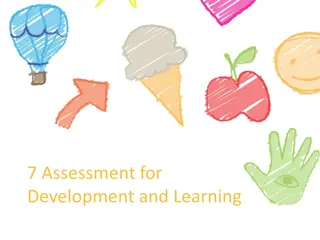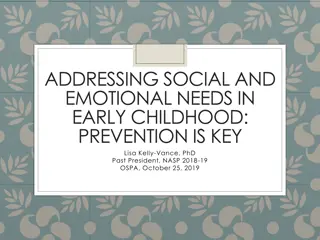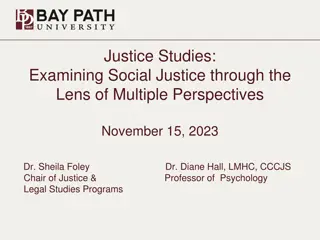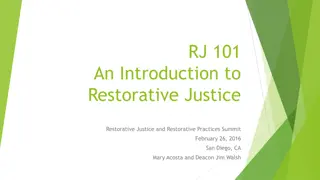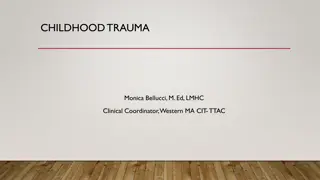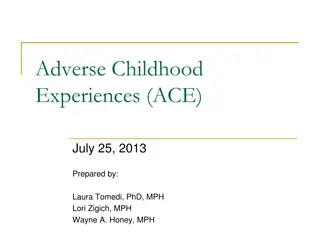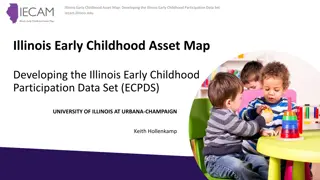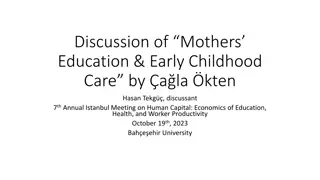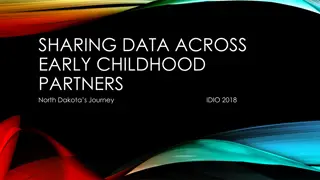Transformation of Early Childhood Development Policies: A Journey Towards Social Justice
Reflecting on the historical context and evolution of Early Childhood Development (ECD) policies, this presentation outlines the mandate for social justice in education, highlighting the disparities in ECD provisioning, the shift towards equitable access, and the role of government in ensuring quality programs for children aged 0-4. The National Development Plan (NDP) emphasizes the need for universal access to quality ECD services with a focus on nutrition and education. Proposals for future improvements are also discussed.
Download Presentation

Please find below an Image/Link to download the presentation.
The content on the website is provided AS IS for your information and personal use only. It may not be sold, licensed, or shared on other websites without obtaining consent from the author.If you encounter any issues during the download, it is possible that the publisher has removed the file from their server.
You are allowed to download the files provided on this website for personal or commercial use, subject to the condition that they are used lawfully. All files are the property of their respective owners.
The content on the website is provided AS IS for your information and personal use only. It may not be sold, licensed, or shared on other websites without obtaining consent from the author.
E N D
Presentation Transcript
SOCIAL JUSTICE SOCIAL JUSTICE IN ECD IN ECD Marie-Louise Samuels 05 July 2019
PRESENTATION OUTLINE PRESENTATION OUTLINE Looking back Mandate Social Justice in Education Happening now Conclusion 2
LOOKING BACK LOOKING BACK
We look back to move forward (West African proverb)
LOOKING BACK LOOKING BACK Audit of Early Childhood Development Policies Nationwide Audit of ECD services Education White Paper 5 on ECE Conditional Grant Children s Act Regulations National Integrated Programme of Action Outcome 1 NELDS NDP Racial discrimination of ECD provisioning 75% fee-based 80% private and 20% public Pre-1994 1994 1999 2004 2009 2014 Education White Paper 1 on Transformation in Education Interim Policy on Early Childhood Education National Pilot Project ECD Policy and Programmes National Curriculum Framework for Children from Birth to Four Outcome 13 Equitable share (Grade R) National Integrated Plan for ECD Tshwaragano Ka Bana ECD International Conference Expanded Public Works Programme
MANDATE MANDATE
NDP NDP CHAPTER 9 CHAPTER 9 Thequality and coverage of ECD services for children aged 0 4 years is poor. The youngest (0 3 years) are best served through clinic, home and community-based programmes 4 5 year-old children benefit from some structured learningin-group programmes . NDP 2030 (Page 300)
NDP NDP CHAPTER 9 (2) CHAPTER 9 (2) Universal access to quality early childhood development for children aged 0 3 must be made available and have a strong nutrition and educational focus. Although early childhood development may continue to be provided through the private sector, a stronger role for the government is essential. NDP 2030 (Page 302) 3
NDP NDP CHAPTER 9 (3) CHAPTER 9 (3) Proposals for ECD Make two (2) years of quality pre-school enrolment for 4 and 5 year olds compulsory before Grade 1. NDP 2030 (Page 300) Institutional Architecture There should be a policy and programme shift to ensure that the Department of Basic Education takes the core responsibility for the provision and monitoring of ECD. Other departments should continue to provide services in a supportive capacity. Resource allocation should gradually reflect the changes in institutional responsibility for early childhood development. NDP 2030 (Page 302)
STATE OF THE NATION STATE OF THE NATION ADDRESS ADDRESS This year, we will migrateresponsibility for ECD centres from Social Development to Basic Education, and Proceed with the process towards two years of compulsory ECD for all children before they enter Grade 1. SoNA February 2019
RECONFIGURATION OF RECONFIGURATION OF GOVERNMENT DEPARTMENTS GOVERNMENT DEPARTMENTS The Minister of Basic Education is responsible for the Department of Basic Education. The DBE will lead an integrated ECD function in collaboration with the DSD and the DoH. 14 June 2019 Statement on Reconfiguration by Presidency
PRESIDENTIAL PROCLAMATION PRESIDENTIAL PROCLAMATION
SOCIAL JUSTICE SOCIAL JUSTICE IN ECD IN ECD
PROGRESS IN TERMS OF SOCIAL PROGRESS IN TERMS OF SOCIAL JUSTICE PRINCIPLES IN SCHOOLING JUSTICE PRINCIPLES IN SCHOOLING PRINCIPLES PROGRESS Access 99% of learners of compulsory school going age are enrolled in an education institution Redress 9.7 million out of 12 million learners are receiving meals every day, and 80% of schools are No Fee paying schools. Equity 54.8% Girl learners enrolled for NSC in 2018 vs 45.2% boy learners 79.8% boy learners obtained NSC vs 76.9% girl learners. Efficiency 56% throughput rate and 9.6% repetition rates Quality Increase in the numbers and percentage of learners achieving admission to Bachelors (28.7% to 33.6%; 153 610 to 172 043) in 2018 Inclusivity 46.5 % of learners with Special Education Needs obtained Bachelor passes in 2018 NSC
SOCIAL JUSTICE IN ECD SOCIAL JUSTICE IN ECD How important are the social justice principles in our programmes as we look to the future? What do we know? What don t we know? How are we measuring the principles of social justice? What are the stubborn problems that we have? What must be done?
HAPPENING NOW HAPPENING NOW
NATURE OF THE SHIFT NATURE OF THE SHIFT Immediate Shift - Overall leadership and coordination; Gradual migration of Grade R and Grade RR By 2024 all Grade R learners will be in schools (Public and Independent) and registered ECD centres; and By 2030 all Grade RR learners will be in registered ECD centres and (Public and Independent Schools).
CHANGE DRIVERS CHANGE DRIVERS Leadership and Management that is underpinned by principles of Access, Equity, Quality, Efficiency, Inclusivity, Social Justice, etc. CHANGE DRIVERS TARGETED CHANGES/AMENDMENTS Legislation and Policy Children s Act 38 of 2005 as amended; SASA 84 of 1996; NQF Act; Integrated ECD Policy of 2015; MRTEQ Policy Regulations Norms and Standards (ECD sites; ECD programmes, funding, nutrition). Funding Reviewing the Funding Model and repurpose some of the Grants (ECD Function Shift; Reprioritisation of Sector Funding etc.) Human Resource Development Refocused HRD targeting Skills for the Changing World at every level including the Professionalisation of ECD practitioners. Systems and Structures Strengthening of and Integration of Data Systems; Procurement Systems; etc. Change Management Aggressive Advocacy and Communication Strategy Partnerships Leveraging on expertise and resources available within and outside of the sector.
CONCLUSION CONCLUSION If you want to go fast, go alone. If you want to go far, go together. African proverb
Ke Ke nako nako








